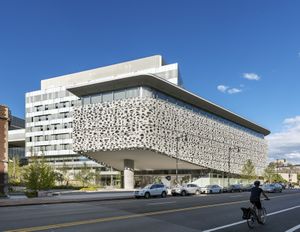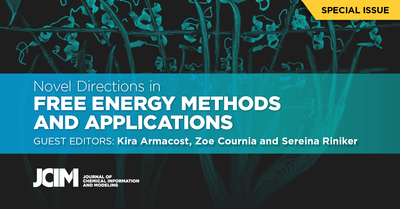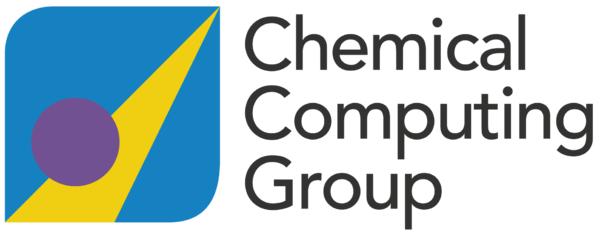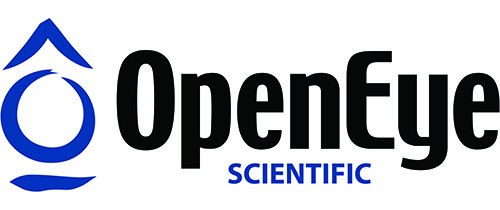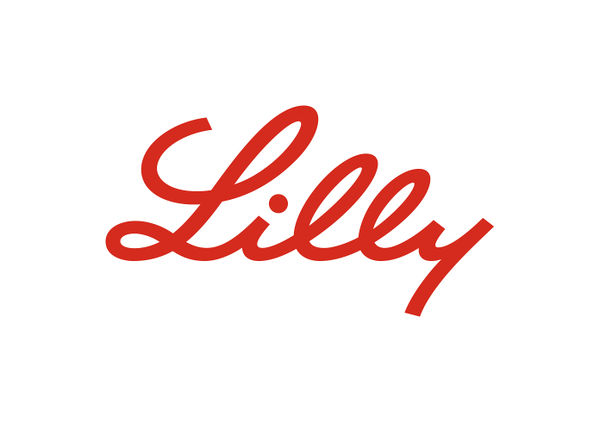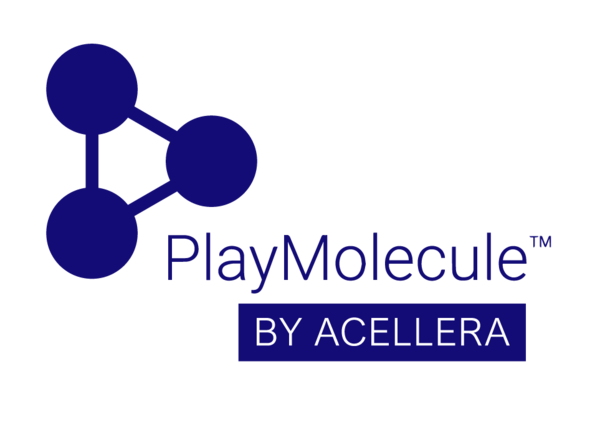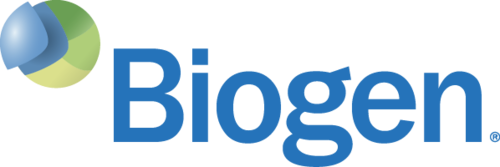2020 Workshop on Free Energy Methods in Drug Design
Virtual Conference 15-17th June 2021
Registration is open! Register Here
Poster session hosted by Schrodinger
| PDT | ET | UK | CET | Tuesday 15th June 2021 |
|---|---|---|---|---|
| 8.15am | 11.15am | 4.15pm | 5.15pm | Introduction from organising committee |
| Session I - moderator: Antonia Mey | ||||
| 8.30am | 11.30am | 4.30pm | 5.30pm | Julien Michel (Edinburgh) - Adaptive absolute binding free energy calculations for lead compounds and flexible proteins |
| 8.55am | 11.55am | 4.55pm | 5.55pm | Hannah Baumann (UC Irvine, Mobley lab) - Binding free energy calculations: Sampling challenges, nonequilibrium switching, and alternate approaches recorded |
| 9.20am | 12.20pm | 5.20pm | 6.20pm | Emilio Gallicchio (Brooklyn CUNY) - The Alchemical Transfer Method: a Streamlined Approach to Absolute and Relative Binding Free Energy Calculations recorded |
| 9.45am | 12.45pm | 5.45pm | 6.45pm | break |
| Session II -moderator: Sereina Riniker | ||||
| 10.00am | 1.00pm | 6.00pm | 7.00pm | Christopher Bayly (Openeye) - Non-Equilibrium Switching in Orion |
| 10.25am | 1.25pm | 6.25pm | 7.25pm | Michael Shirts (Boulder) - Learning Free Energy Surfaces recorded |
| 10.50am | 1.50pm | 6.50pm | 7.50pm | POSTERS |
| Session III - moderator: Jonah Vilseck | ||||
| 11.15am | 2.15pm | 7.15pm | 8.15pm | David Minh (Illinois) - Large-scale Free Energy Calculations with Implicit Ligand Theory recorded |
| 11.40am | 2.40pm | 7.40pm | 8.40pm | Cindy Yan (Merck) - Binding affinity predictions in small-molecule drug discovery: Is balancing accuracy and efficiency possible? recorded |
| 12.05pm | 3.05pm | 8.05pm | 9.05pm | Matteo Aldeghi (Vector Institute) - Structure-based predictions of kinase inhibitor resistance: a prospective evaluation recorded |
| PDT | ET | UK | CET | Wednesday 16th June 2021 |
|---|---|---|---|---|
| 8.15am | 11.15am | 4.15pm | 5.15pm | Introduction |
| Session I-moderator: Richard Lonsdale | ||||
| 8.30am | 11.30am | 4.30pm | 5.30pm | Benjamin Ries (ETH Zurich, Riniker lab) - Relative binding free energies with scaffold-hopping type transformations using RE-EDS recorded |
| 8.55am | 11.55am | 4.55pm | 5.55pm | Jonathan Essex (Southampton) |
| 9.20am | 12.20pm | 5.20pm | 6.20pm | Wonpil Im (Lehigh) - What can CHARMM-GUI do for you? recorded |
| 9.45am | 12.45pm | 5.45pm | 6.45pm | break |
| Session II -moderator: Michalis Papadourakis | ||||
| 10.00am | 1.00pm | 6.00pm | 7.00pm | Jonah Vilseck (Indiana) - Multisite Sampling with Discrete Gibbs Sampler-Based Lambda-Dynamics recorded |
| 10.25am | 1.25pm | 6.25pm | 7.25pm | William Jorgensen (Yale) - 40 Years of Free-Energy Calculations from Solvent Effects to SARS-CoV-2 Inhibitors recorded |
| 10.50am | 1.50pm | 6.50pm | 7.50pm | POSTERS |
| Session III -moderator: Emilia Pecora de Barros | ||||
| 11.40am | 2.40pm | 7.40pm | 8.40pm | Yutong Zhao (Relay Tx) - Improved Orientational Restraints for Binding Free Energies |
| 12.05pm | 3.05pm | 8.05pm | 9.05pm | Lyna Luo (Western) - Understand and optimize reversible covalent inhibitors and allosteric agonists recorded |
| PDT | ET | UK | CET | Thursday 17th June 2021 |
|---|---|---|---|---|
| 8.15am | 11.15am | 4.15pm | 5.15pm | Introduction |
| Session I-moderator: Zoe Cournia | ||||
| 8.30am | 11.30am | 4.30pm | 5.30pm | Niels Hansen (Stuttgart) - Exploring a correlation between Soret and partition coefficient by means of free-energy calculations recorded |
| 8.55am | 11.55am | 4.55pm | 5.55pm | Robert Abel (Schrodinger) - Models to Medicines: The impact of large scale physics-based design on clinical candidate discovery recorded |
| 9.20am | 12.20pm | 5.20pm | 6.20pm | Vytautas Gapsys (Max Planck Institute) - Alchemical Absolute Protein-Ligand Binding Free Energies for Drug Design recorded |
| 9.45am | 12.45pm | 5.45pm | 6.45pm | break |
| Session II -moderator: Kira Armacost | ||||
| 10.00am | 1.00pm | 6.00pm | 7.00pm | Joy Yang (Pfizer) |
| 10.25am | 1.25pm | 6.25pm | 7.25pm | Brian Radak (Silicon Tx) - Advancing Drug Discovery with a Practical Approach to Free Energy Simulations |
| 10.50am | 1.50pm | 6.50pm | 7.50pm | POSTERS |
| Session III -moderator: Zhuyan Guo | ||||
| 11.15am | 2.15pm | 7.15pm | 8.15pm | Dave Thompson (CCG) + Kira Armacost(GSK) - "Free Energy Methods in Drug Discovery : “It will be the most important field in computational chemistry.”" - recorded |
| 11.40am | 2.40pm | 7.40pm | 8.40pm | Gary Tresadern (Janssen) |
| 12.05pm | 3.05pm | 8.05pm | 9.05pm | Gary Tresadern (Janssen) |
POSTERS TUESDAY
Some presentations can be viewed ahead of the meeting here
| PDT | ET | UK | CET | Tuesday 15th June 2021 | Abstract |
|---|---|---|---|---|---|
| 10.50am | 1.50pm | 6.50pm | 7.50pm | POSTERS | |
| Michael Gillhofer BOKU University of Natural Resources and Life Sciences, Vienna | Importance of water molecules for alchemical free-energy calculations: One challenge in the field of free-energy calculations is the occurrence of water molecules since inappropriate placements can lead to a stabilization of different conformational orientations of the ligand. With classical alchemical perturbation methods such as thermodynamic integration (TI), it is essential to know the amount of water molecules in the active site of the respective ligands, but the resolution of the crystal structure and the correct assignment of the electron density can sometimes lead to challenges in the placement of water molecules. This work aims to calculate relative binding free-energy differences using extended TI for two different ligands for the system of the heatshock protein 90 (HSP90), where it has been shown that the correct amount of water molecules in the active site can change with the respective ligand. To determine the correct number of waters a newly developed technique AEDS (accelerated enveloping distribution sampling) was used. This technique allows the perturbed waters to fluctuate between dummy and real state, providing information about the number of waters preferred for the ligand of interest. | ||||
| Oriol Gracia i Carmona Universität für Bodenkultur Wien (BOKU) | One of the most challenging aspects in the calculation of free energies is the presence of slow relaxing processes. The reason behind this is that the state-of-the-art methods currently used rely on performing several short simulations, increasing the number of times that those slow processes need to be sampled. Such sampling limitation is often overcome by adding a bias based on previous knowledge of the system, which may not be always available. AEDS (Accelerated enveloping distribution sampling) is a recently developed technique that allows efficient sampling of the end-states in a single simulation which integrates the use of a reference state with accelerated MD. With the aim of testing the capabilities of AEDS and of providing guidelines on how to setup and analyze AEDS simulations, we have used T4 L99A lysozyme as a test system. The T4 L99A lysozyme contains a valine, Val 111, which conformation highly influences the binding efficiencies of the ligands, making it an ideal test system to see the performance of AEDS on a slow relaxing process. | ||||
| Jonathan Barnes University of Idaho | Analysis of Software Methods for Estimation of Protein-Protein Relative Binding Affinity: A growing number of computational tools have been developed to accurately and rapidly predict the impact of amino acid mutations on protein-protein relative binding affinities. Such tools have many applications, for example, designing new drugs and studying evolutionary mechanisms. In the search for accuracy, many of these methods employ expensive yet rigorous molecular dynamics simulations. By contrast, non-rigorous methods use less exhaustive methods, allowing for more efficient calculations. This trade-off between accuracy and computational expense makes it difficult to determine the best method for a given context. Here, eight non-rigorous computational methods were assessed using eight antibody-antigen and eight non-antibody-antigen complexes for their ability to accurately predict relative binding affinities (ΔΔG) for 654 single mutations. Our results suggest these methods can be used to quickly and accurately predict stabilizing versus destabilizing mutations but are less accurate at predicting actual binding affinities. | ||||
| Anthony Hazel University of Maryland, Baltimore | Rapid and accurate estimation of protein–ligand relative binding affinities using site-identification by ligand competitive saturation: Predicting relative protein–ligand binding affinities is a central pillar of lead optimization efforts in structure-based drug design. The site identification by ligand competitive saturation (SILCS) methodology is based on functional group affinity patterns in the form of free energy maps that may be used to compute protein–ligand binding poses and affinities. Using the SILCS methodology we can achieve an average rank-ordering accuracy of 74-77% when considering eight well-studied protein. This accuracy increases to 80-82% when the SILCS atomic free energy contributions are optimized using a Bayesian Markov-chain Monte Carlo approach. Overall, the SILCS methodology yields similar or better-quality predictions without a priori need for known ligand orientations in terms of the different metrics when compared to current alchemical-based approaches with significant computational savings while additionally offering quantitative estimates of individual atomic contributions to binding free energies. These results further validate the SILCS methodology as an accurate, computationally efficient tool to support lead optimization and drug discovery. | ||||
| Sheenam Khuttan Brooklyn College, CUNY | Relative Binding Free Energy Calculations for the GDCC SAMPL8 Blinded Challenge using the Alchemical Transfer Method: Alchemical Relative Binding Free Energy (RBFE) calculations are increasingly becoming one of the work horses of structure-based drug development. However, applications involving variations of ligand charge and ligand scaffold, such as ring opening/closing and linker deletion/extension, remain challenging. Here, we illustrate the application of our Alchemical Transfer Method (ATM) to the calculation of relative binding free-energy differences for the Gibbs Deep Cavitand Complexes (GDCC) SAMPL8 host-guest challenge benchmark. ATM is applied to the said complexes, each with one ligand at the binding site and the second unbound ligand in water, all in a single solvent box. The application of an alchemical perturbation switches the initial positions of the two ligands through a symmetric alchemical intermediate. We found that ATM's dual topology protocol can successfully tackle ligand pairs with different scaffolds and ionization states. We continue to illustrate applications of ATM RBFE to protein-ligand systems with different scaffolds. |
Introduction
This workshop will focus on the current state of free energy techniques.
Our goal in this workshop is to bring together experts from pharma and supporting industries, as well as academia, in an intense and focused workshop to identify challenges and help chart the path forward. We are particularly interested in hearing about use cases, pitfalls and their solutions. We also firmly believe we can learn a great deal from failure, so we hope participants will go beyond just highlighting success stories to provide more detailed insight into successes and failures.
Dates and Location
The conference will be held 6th - 8th May 2020, finishing at 3pm on Friday 8th, at the Novartis Institute for BioMedical Research, Cambridge, MA.
MEETING HAS BEEN POSTPONED UNTIL 2022
The following social arrangements are in place for the evenings of the conference.
Tuesday evening - a reception will be held at Relay Therapeutics, 399 Binney St.
Wednesday evening - a poster session will be held at the conference venue, Novartis.
Thursday evening - Schrödinger will sponsor an evening session at a nearby venue - TBD.
Virtual Conference - November 2020
11-13th November 2020
View the conference talk recordings HERE
| PDT | ET | UK | CET | Wednesday 11th November 2020 |
|---|---|---|---|---|
| 8.30am | 11.30am | 4.30pm | 5.30pm | Introduction |
| Session 1 Moderator : Camilo Velez-Vega | ||||
| 8.45am | 11.45am | 4.45pm | 5.45pm | Francesca Deflorian, Sosei Heptares, Prediction of ligand binding affinity with Free Energy Perturbation for GPCRs |
| 9.10am | 12.10pm | 5.10pm | 6.10pm | Mark Mackey, Cresset, Automated Assessment of Binding Affinity via Alchemical Free Energy Calculations --- recorded |
| 9.35am | 12.35pm | 5.35pm | 6.35pm | Aysegul Ozen, Blueprint Medicines, FEP Impact on Early and Late-Stage Programs across Blueprint Medicines Portfolio --- recorded |
| 10am | 1pm | 6pm | 7pm | break |
| Session 2 Moderator : Sereina Riniker | ||||
| 10.30am | 1.30pm | 6.30pm | 7.30pm | Alex Dickson, Michigan State University, Binding free energies from weighted ensemble path sampling --- recorded |
| 10.55am | 1.55pm | 6.55pm | 7.55pm | Ido Ben-Shalom, University of California, San Diego, Exchanging Buried Water in Protein-Ligand Free Energy Calculations by Monte Carlo/Molecular Dynamics Sampling --- recorded |
| 11.20am | 2.20pm | 7.20pm | 8.20pm | Maximilian Ebert, CCG, Soft-core potential optimization to increase accuracy and stability in Free Energy Calculations using AMBER Thermodynamic Integration in MOE --- recorded |
| PDT | ET | UK | CET | Thursday 12th November 2020 |
|---|---|---|---|---|
| 8.30am | 11.30am | 4.30pm | 5.30pm | Introduction |
| Session 1 Moderator : Zoe Cournia | ||||
| 8.45am | 11.45am | 4.45pm | 5.45pm | Daria Kokh, Heidelberg Institute for Theoretical Studies, Exploring ligand unbinding kinetics using random acceleration: what can we learn? --- recorded |
| 9.10am | 12.10pm | 5.10pm | 6.10pm | Hugo Gutierrez de Teran, University of Uppsala, Q-FEP: Versatile, robust and automated FEP protocols to integrate SAR and mutagenesis data on ligand design --- recorded |
| 9.35am | 12.35pm | 5.35pm | 6.35pm | Heather Carlson, University of Michigan, MixMD: Mapping Protein Surfaces |
| 10am | 1pm | 6pm | 7pm | break |
| Session 2 Moderator : Kira Armacost | ||||
| 10.30am | 1.30pm | 6.30pm | 7.30pm | Jay Ponder, Washington University in St. Louis, AMOEBA Host-Guest Binding Free Energies for the SAMPL7 Challenge --- recorded |
| 10.55am | 1.55pm | 6.55pm | 7.55pm | Prabhu Raman, BIOVIA, Efficient relative binding free energy calculations using Lambda Dynamics --- recorded |
| 11.20am | 2.20pm | 7.20pm | 8.20pm |
| PDT | ET | UK | CET | Friday 13th November 2020 |
|---|---|---|---|---|
| 8.30am | 11.30am | 4.30pm | 5.30pm | Introduction |
| Session 1 Moderator : Jonah Vilseck | ||||
| 8.45am | 11.45am | 4.45 -5.10 | 5.45 - 6.10 | Christina Schindler, Merck KGaA, Evaluation of free energy calculations on the Merck FEP benchmark datasets |
| 9.10am | 12.10pm | 5.10 - 5.35 | 6.10 - 6.35 | Lingle Wang, Schrodinger, Improving the Accuracy of Free Energy Calculations via Enhanced Sampling of Water Relaxation, Ionization Equilibrium and Protein Conformational Changes --- recorded |
| 9.35am | 12.35pm | 5.35pm | 6.35pm | Darrin York, Rutgers University, Emerging methods for accurate protein-ligand binding free energy prediction in AMBER --- recorded |
| 10am | 1pm | 6pm | 7pm | break |
| Session 2 Moderator : Michael Gilson | ||||
| 10.30am | 1.30pm | 6.30pm | 7.30pm | Lance Westerhoff, QuantumBio Inc., MoveableType: A fast, accurate method for binding free energy prediction and simulation --- recorded |
| 10.55am | 1.55pm | 6.55pm | 7.55pm | Chia-en Chang, University California Riverside, Tuning ligand binding kinetics using transient states and free energy barriers --- recorded |
| 11.20am | 2.20pm | 7.20pm | 8.20pm | Closing remarks |
Accommodation
Discount rates may be available for some hotels in the area. Novartis suggests that attendants individually call CWT at 1-800-929-2231 and ask for the “Novartis discount rate” at the following hotels (mentioning their attendance to a workshop at NIBR):
Le Meridian (20 Sidney Street, Cambridge MA)
Hyatt Regency (575 Memorial Drive, Cambridge MA)
Kimpton Marlowe Hotel (25 Edwin H Land Blvd, Boston MA)
Cambridge Marriott (120 Broadway Six Cambridge Center, Cambridge MA)
Novartis is close to the Central stop on the red line, as well as the number 1 bus route, and there may be more affordable accommodation options using these transport links.
Registration
Registration will cost $100 for admission to the 2.5 day conference, which will cover both breakfast and lunch, as well as refreshments in the evening sessions. We will also be accepting submitted abstracts for oral and poster presentations at this time. The deadline for oral presentations is December 16th 2019, while poster presentations is March 27th 2020 DUE TO POSTPONEMENT: June 26th 2020. Submitting an abstract alone does not guarantee you a place, please make sure to register too.
- Registration is full! To join the waitlist please contact Hannah Bruce Macdonald (hannah.brucemacdonald@choderalab.org). If you are no longer planning to attend, please let us know and we can refund your fee.
- Abstract submission is here
Workshop Themes
As this is the 10th birthday of the first 2010 free energy workshop, we will be holding a session celebrating the last 10 years - how far have we come, and where do we still need to go?
Other sessions will be held to discuss the current software that is currently available to the field - both commercial packages, and open-source academic efforts.
Discussions about the novel methods and algorithms that are in development and where these can be best applied will be held.
Results of free energy methods will be presented - both the successes and the limitations - with the idea of addressing what the community would like to see at the following meeting.
Finally, half a day of talks will be dedicated to the intersection of free energy methods with machine learning.
JCIM Special Issue
JCIM is aiming to publish a special issue on Novel Directions in Free Energy Methods and Applications for publication in the Fall of 2020. The submission deadline is June 1st, 2020. This is spearheaded by Kira Armacost, Sereina Riniker and Zoe Cournia. For more information, please read here.
Sponsors, Social Media and Streaming
Sponsors
We would like to thank the following sponsors:
We are currently looking for sponsorship for the event. If your organisation would be interested, please contact any of the organisers.
Particular thanks to the Boston Area Group for Informatics and Modeling (BAGIM)for helping with the financial organisation of this meeting.
Social Media
Twitter hashtags: #alchemy2020
Slack: https://alchemistry.slack.com
Streaming
We will be streaming the conference, and uploading talks after the conference, however the recording of any talk is at the discretion of the speaker, their employer and collaborators.
Schedule
Talks will be held from 9am to 6pm (Wednesday and Thursday) or 3pm (Friday) at Novartis.
Keynote speaker
- Herman van Vlijmen, Janssen
Confirmed speakers
- Robert Abel, Schrödinger
- Christopher Bayly, OpenEye Scientific
- Ido Y. Ben-Shalom, University of California, San Diego
- Phil Biggin, University of Oxford
- Heather Carlson, University of Michigan
- Chia-en Chang, University California Riverside
- Chris Chipot, University of Illinois
- Lucy Colwell, University of Cambridge
- Francesca Deflorian, Sosei Heptares
- Alex Dickson, Michigan State University
- Jonathan Essex, University of Southampton
- Gianni de Faabrits, Acellera
- Andrey Frolov, AstraZeneca
- Niels Hansen, University of Stuttgart
- William Jorgensen, Yale University
- Dariah Kokh, Heidelberg Institute for Theoretical Studies
- Wonpil Im, Lehigh University
- Yun Lyna Luo, Western University of Health Sciences
- Mark Mackey, Cresset
- Katarina Meier, Bayer
- David Mobley, University California, Irvine
- Julien Michel, University of Edinburgh
- David Minh, Illinois Institute of Technology
- Aysegul Ozen, Blueprint Medicines
- Jay Ponder, Washington University in St. Louis
- Prabhu Raman, BIOVIA
- Sereina Riniker, ETH Zürich
- Christina Schindler, Merck KGaA
- Michael Schnieders, University of Iowa
- Woody Sherman, Silicon Therapeutics
- Michael Shirts, University of Colorado, Boulder
- Hugo Gutierrez de Teran, University of Uppsala
- David Thompson, CCG
- Jonah Vilseck, Indiana University School of Medicine
- Lingle Wang, Schrödinger
- Lance Westerhoff, QuantumBio Inc.
- Xin Cindy Yan, Merck & Co., Inc.
- Joy Yang, Pfizer
- Darrin York, Rutgers University
- Yutong Zhao, Relay Therapeutics
Organizers
- Kira Armacost, GlaxoSmithKline Pharmaceuticals (kira.x.armacost@gsk.com)
- Hannah Bruce Macdonald, Memorial-Sloan Kettering Cancer Center (hannah.brucemacdonald@choderalab.org)
- Jonah Vilseck, Indiana University School of Medicine (jvilseck@iu.edu)
- Zoe Cournia, Biomedical Research Foundation Academy of Athens (zcournia@bioacademy.gr)
- Michael Gilson, UC San Diego (mgilson@ucsd.edu)
- Camilo Velez-Vega, Novartis Institutes for BioMedical Research (camilo.velez-vega@novartis.com)
- Sereina Riniker, ETH Zürich (sriniker@ethz.ch)
- Anthony Arvanites, Eli Lilly and BAGIM (aarvanites@bagim.org)
We also thank current advisors and previous organizers:
- Brian McClain, Vertex (brian_mcclain@vrtx.com)
- Vijay Pande, Stanford University (pande@stanford.edu)
- Michael Shirts, University of Colorado Boulder (michael.shirts@colorado.edu)
- Camilo Velez-Vega, Novartis Institutes for BioMedical Research (camilo.velez-vega@novartis.com)
- John Chodera, Memorial-Sloan Kettering Cancer Center (john.chodera@choderalab.org)
- Greg Bowman, Washington University in St. Louis (bowman@biochem.wustl.edu)
- Callum Dickson, Novartis (callum.dickson@novartis.com)
- Jose Duca, Novartis (jose.duca@novartis.com)
- Viktor Hornak, Novartis (viktor.hornak@novartis.com)
- John Manchester, Novartis (john.manchester@novartis.com)
- Antonia Mey, University of Edinburgh (antonia.mey@ed.ac.uk)
- David Mobley, University of California at Irvine (dmobley@uci.edu)
- Michael Schnieders, The University of Iowa (michael-schnieders@uiowa.edu)
- Jana Shen, The University of Maryland (Jana.Shen@rx.umaryland.edu)
- Woody Sherman, Silicon Therapeutics (woody@silicontx.com)
Conference Code of Conduct
All attendees, speakers, sponsors and volunteers at our conference are required to agree with the following code of conduct. Organisers will enforce this code throughout the event. We expect cooperation from all participants to help ensure a safe environment for everybody.
Need Help? Please contact the organising committee either in person or via email. Members of the organising committee are listed above.
The Quick Version
Our conference is dedicated to providing a harassment-free conference experience for everyone, regardless of gender, gender identity and expression, age, sexual orientation, disability, physical appearance, body size, race, ethnicity, religion (or lack thereof), or technology choices. We do not tolerate harassment of conference participants in any form. Sexual language and imagery is not appropriate for any conference venue, including talks, workshops, parties, Twitter and other online media. Conference participants violating these rules may be sanctioned or expelled from the conference without a refund at the discretion of the conference organisers.
The Less Quick Version
Harassment includes offensive verbal comments related to gender, gender identity and expression, age, sexual orientation, disability, physical appearance, body size, race, ethnicity, religion, technology choices, sexual images in public spaces, deliberate intimidation, stalking, following, harassing photography or recording, sustained disruption of talks or other events, inappropriate physical contact, and unwelcome sexual attention.
Participants asked to stop any harassing behavior are expected to comply immediately.
Sponsors are also subject to the anti-harassment policy. In particular, sponsors should not use sexualised images, activities, or other material. Booth staff (including volunteers) should not use sexualised clothing/uniforms/costumes, or otherwise create a sexualised environment.
If a participant engages in harassing behavior, the conference organisers may take any action they deem appropriate, including warning the offender or expulsion from the conference with no refund.
If you are being harassed, notice that someone else is being harassed, or have any other concerns, please contact a member of the organising committee immediately.
A member of the organising committee will be happy to help participants contact local law enforcement, provide escorts, or otherwise assist those experiencing harassment to feel safe for the duration of the conference. We value your attendance.
We expect participants to follow these rules at conference and workshop venues and conference-related social events.
The code of conduct text was taken from https://github.com/confcodeofconduct/confcodeofconduct.com in a slightly adapted form.


